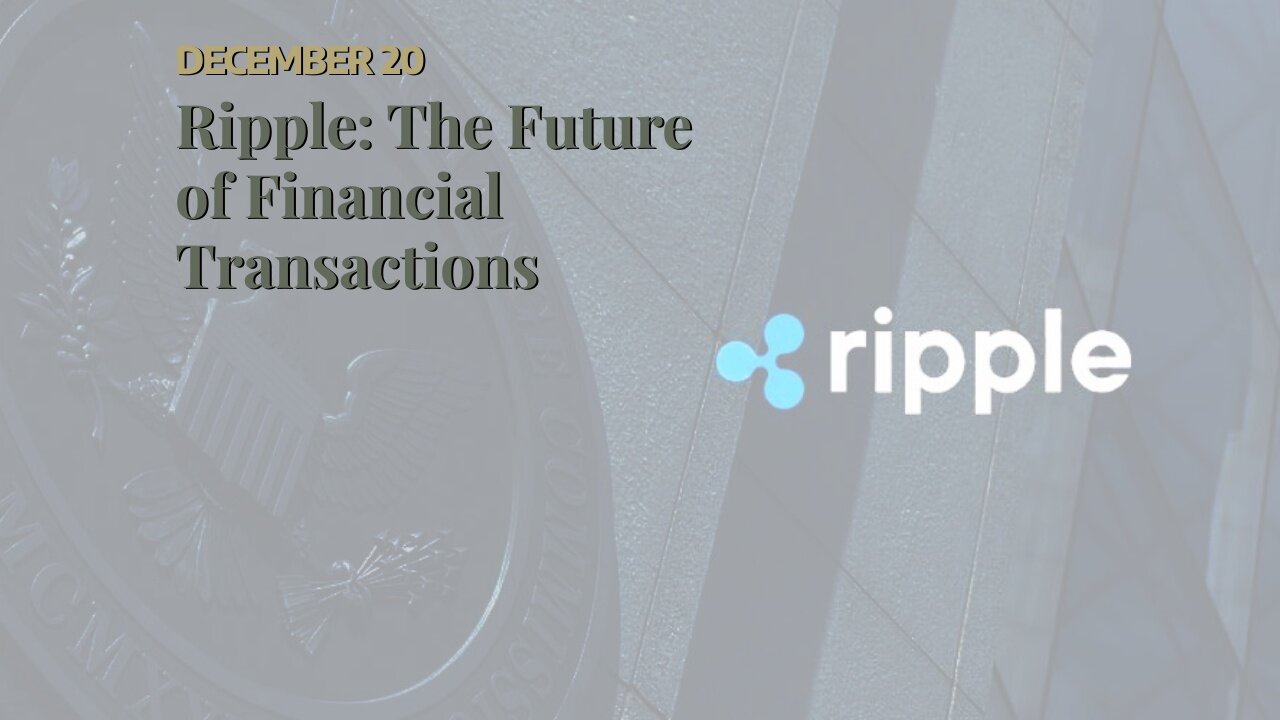Premium Only Content

Ripple: The Future of Financial Transactions
Ripple: The Future of Financial Transactions
In a world where financial transactions are becoming increasingly digital, Ripple is positioning itself as the future of how these transactions will be made. By using a distributed ledger system, Ripple aims to provide a faster, more efficient, and more secure way to send money around the world. While there are some challenges that Ripple will need to overcome, its potential is significant and could revolutionize the way we make financial transactions. Photo by Ivan Samkov on Pexels What is Ripple?
What problem does it solve?
Ripple is a distributed open-source protocol that offers a real-time payment system, currency exchange,...
https://finetimer.site/ripple-the-future-of-financial-transactions/
In a world where financial transactions are becoming increasingly digital, Ripple is positioning itself as the future of how these transactions will be made. By using a distributed ledger system, Ripple aims to provide a faster, more efficient, and more secure way to send money around the world. While there are some challenges that Ripple will need to overcome, its potential is significant and could revolutionize the way we make financial transactions. Photo by Ivan Samkov on Pexels What is Ripple?
What problem does it solve?
Ripple is a distributed open-source protocol that offers a real-time payment system, currency exchange, and remittance network. The Ripple protocol enables fast and inexpensive transactions between two parties without the need for a central intermediary.
The problem that Ripple solves is the lack of efficiency in the current banking system. Transactions can take days to process and are often held up by intermediaries. This results in high costs and slow speeds. Ripple aims to fix this by providing a decentralized platform that allows for fast, cheap, and reliable transactions.
How does it work?
Ripple works by using a shared public ledger that is maintained by a network of computers around the world. This ledger records all Ripple transactions and is constantly updated so that all users have the most up-to-date information. Because there is no central authority, anyone can join the network and help validate transactions.
Transactions on the Ripple network are processed very quickly, typically taking just 4 seconds to confirm. They are also very cheap, with fees as low as $0.00001 per transaction. And because there is no need for an intermediary, transactions can be made directly between two parties without delay.
Ripple’s Potential
Why is Ripple a game changer?
Ripple has the potential to be a game changer because it has the ability to revolutionize the way financial transactions are conducted. Ripple is a distributed ledger system that allows for near-instantaneous transactions with minimal fees. This could potentially make traditional banking systems obsolete, as there would be no need for them.
Ripple is also scalable, meaning that it can handle a large number of transactions without slowing down. This is in contrast to traditional banking systems, which often experience slowdowns and disruptions during periods of high transaction volume.
Finally, Ripple is more secure than traditional banking systems because it uses cryptographic methods to protect against fraud and hacked accounts.
Ripple’s Challenges
What are the challenges Ripple faces?
Ripple is not without its challenges. One of the biggest challenges it faces is getting people to actually use it. Right now, Ripple is mostly used by banks and financial institutions. But if Ripple wants to truly revolutionize the way money is sent around the world, it needs to get regular people to use it.
Another challenge Ripple faces is scalability. The current system can only handle about 1,500 transactions per second. Compare that to Visa, which can handle 24,000 transactions per second. If Ripple is going to be used for global payments, it will need to be able to scale up its transaction capacity.
Finally, Ripple faces regulatory hurdles in many countries. Because Ripple is a decentralized network, it isn’t subject to any one country’s regulations. That could make it difficult for Ripple to operate in countries with strict financial regulations.
Can Ripple overcome these challenges?
Despite these challenges, there’s reason to believe that Ripple can overcome them and become a major player in the world of finance. For one thing, Ripple has already made significant progress in getting people to use its netw...
-
 6:44
6:44
FineTimer
2 years agoHow to Choose the Right Router Protocol for Your Network
531 -
 2:00:02
2:00:02
Inverted World Live
8 hours agoMake Crop Circles Great Again | Ep. 64
238K13 -
 2:45:21
2:45:21
TimcastIRL
8 hours agoIRAN STRIKE FAILED Claims LEAKED Intel Report, Trump Admin DENIES Report | Timcast IRL
248K164 -
 2:50:06
2:50:06
PandaSub2000
2 days agoGollum... again | ULTRA BEST AT GAMES (Original Live Version)
16.1K1 -
 45:05
45:05
Man in America
12 hours agoThe Banking Cartel NEEDS WW3—Can a Ceasefire Derail the Reset? w/ Collin Plume
79.5K36 -
 8:58:06
8:58:06
SpartakusLIVE
10 hours agoDuos w/ Rallied || The Spartan and The Dragon DOMINATE the Tower of Power
73.3K -
 1:36:08
1:36:08
Adam Does Movies
11 hours ago $6.61 earnedTalking Movies + Ask Me Anything - LIVE
56.8K2 -
 2:57:05
2:57:05
MissesMaam
7 hours agoBack At It Again | Stardew Co-Op 💚✨
30.1K2 -

BSparksGaming
6 hours agoSplitgate 2 - sday! Tagging Tactics Event! Graffiti Galor!
54.9K1 -
 2:20:41
2:20:41
Barry Cunningham
9 hours agoPRESIDENT TRUMP FACES THE WRATH OF THE DEEP STATE AND MORE NEWS!
87.9K88